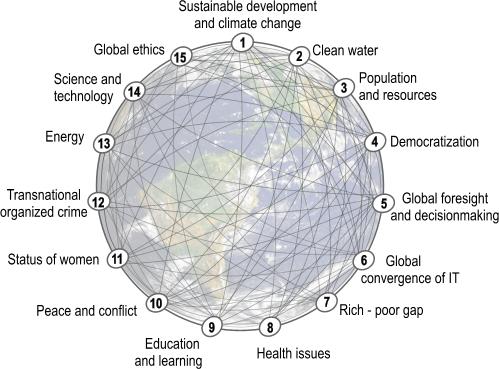The 15 Global Challenges provide a framework to assess the global and local prospects for humanity. A brief overview of each challenge, a list with actions to address them, and regional considerations are continually updated with improved insights since 1996. The 15 Global Challenges are a result of continuous research, Delphi studies, interviews, and participation of over 4,000 experts from around the world — see a short history.
The Global Challenges are transnational in nature and transInstitutional and interdisciplinary in solution. They cannot be addressed by any government or institution acting alone. They require collaborative action among governments, international organizations, corporations, universities, NGOs, and creative individuals. Although listed in sequence, Challenge 1 on sustainable development and climate change is no more or less important than Challenge 15 on global ethics. There is greater consensus about the global situation as expressed in these Challenges and the actions to address them than is evident in the news media.
Short videos of each of the 15 Global Challenges are also available.
Click on the challenge of your choice to see a short overview, actions, and regional considerations.
The 15 Global Challenges:
1. How can sustainable development be achieved for all while addressing global climate change?
2. How can everyone have sufficient clean water without conflict?
3. How can population growth and resources be brought into balance?
4. How can genuine democracy emerge from authoritarian regimes?
5. How can decisionmaking be enhanced by integrating improved global foresight during unprecedented accelerating change?
6. How can the global convergence of information and communications technologies work for everyone?
7. How can ethical market economies be encouraged to help reduce the gap between rich and poor?
8. How can the threat of new and reemerging diseases and immune micro-organisms be reduced?
9. How can education make humanity more intelligent, knowledgeable, and wise enough to address its global challenges?
10. How can shared values and new security strategies reduce ethnic conflicts, terrorism, and the use of weapons of mass destruction?
11. How can the changing status of women help improve the human condition?
12. How can transnational organized crime networks be stopped from becoming more powerful and sophisticated global enterprises?
13. How can growing energy demands be met safely and efficiently?
14. How can scientific and technological breakthroughs be accelerated to improve the human condition?
15. How can ethical considerations become more routinely incorporated into global decisions?
Readers are invited to contribute their insights to improve the overview, actions, and regional consideration of any of these 15 Global Challenges at any time to info@millennium-project.org.


